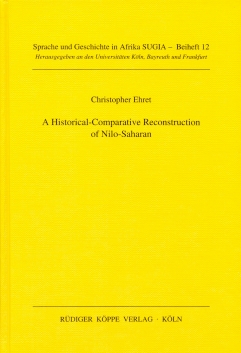
A Historical-Comparative Reconstruction of Nilo-Saharan
Author: Christopher Ehret.
Series: Sprache und Geschichte in Afrika. SUGIA Supplements Volume 12
200118 pp. Roman, 663 pp.
34 tables, 6 lists, indices: Proto-Nilo-Saharan Consonant Occurrence, Reconstructed Root Meanings
Text language(s): English
E-book
€ 69.80
Buy 'A Historical-Comparative Reconstruction of Nilo-Saharan' as a downloadable PDF document directly from our online shop »
Nilo-Saharan is one of the four major language families on the African continent. It extends eastwards from the Niger to Western Ethiopia and further southwards to Northern Tanzania. While the status of Nilo-Saharan as a phylum has been largely accepted since Greenberg (1963), the internal classification has remained controversial. The present volume is intended as a decisive contribution towards the verification of the internal relationship of the Nilo-Saharan languages.
Using regular sound correspondences for verifying levels of internal relationship was begun in the 1980s, but this work takes up the results achieved hitherto and continues from this basis. New sources are taken into consideration: apart from reconstructing consonants, vowels and tone, the study also includes derivational and inflectional morphology as well as pronouns.
The book consists of two main parts. The first part (chapter 2-8) is dedicated to the reconstruction of consonants, vowels and tone, to the subclassification of Nilo-Saharan, verbal and nominal derivation, inflection and the pronominal system. The second part (chapter 9) is an etymological dictionary of 1,606 roots, complemented by annotations and reflexes of the roots in the particular languages. More than 10,000 roots are cited directly. The analysis of the first part (chapter 2-8) is based on the data arranged in chapter 9.
The most important result of Ehret’s work concerns the relationship of Songay in the Nilo-Saharan context. The author argues convincingly that Songhay should be regarded as an integral member of the Nilo-Saharan family. Connections with Mande must be seen as borrowings from Songhay into Mande. Furthermore, the established regular sound correspondences and the reconstructed Proto-Nilo-Saharan vocabulary allow for drawing up phonological histories of each language and distinguishing between loan versus long-term inherited words.
Under these links you will find a detailed review of the book by Roger Blench, further descriptions and text collections of West African Songhay / Songrai varieties and publications by the author:
Accompanying material:
- A Grammar of Koyraboro (Koroboro) Senni
(ISBN 978-3-89645-106-4 ) - A Grammar of Tadaksahak
(ISBN 978-3-89645-931-2 ) - La force des choses ou l’épreuve ‘nilo-saharienne’
(ISBN 978-3-89645-099-9 ) - Lexique Dendi (Songhay)
(ISBN 978-3-927620-45-2 ) - Texts in Koroboro Senni (Songhay of Gao, Mali)
(ISBN 978-3-89645-261-0 ) - Texts in Koyra Chiini (Songhay of Timbuktu, Mali)
(ISBN 978-3-89645-260-3 )
Cross-reference:
- „Mehr als nur Worte ...”
(ISBN 978-3-89645-125-5 ) - A Dictionary of Sandawe
(ISBN 978-3-89645-867-4 ) - Actes du Cinquième Colloque de Linguistique Nilo-Saharienne / Proceedings of the Fifth Nilo-Saharan Linguistics Colloquium, Nice, 24–29 August 1992
(ISBN 978-3-927620-72-8 ) - Historical Language Contact in Africa
(ISBN 978-3-89645-091-3 ) - Language and History in the Light of Reconstructions
(ISBN 978-3-89645-722-6 ) - Patterns of Linguistic Convergence in Africa
(ISBN 978-3-89645-364-8 )
Reviews
Der Autor hat aus eigenen Feldforschungen und Vorarbeiten und von drei Dutzend Spezialisten dieser Sprachfamilie etwa 1.600 Wortwurzeln zusammengetragen und ins Englische übersetzt. Zu dieser Vielzahl trägt bei, dass er für die Konsonanten sehr konservative Verwandtschaftskriterien angelegt hat, so dass viele sich nur durch homorganische Lautverschiebungen unterscheidende Wortwurzeln nicht zusammenlegt worden sind. Die Anlage 2 enthält einen alphabetischen Index der englischen Bedeutungen der gesammelten Wortwurzeln. Leider fehlen hie und da die Wortwurzeln für einige fundamentale Bedeutungen wie "to count", "5", to hang", "river", "lake", "soot" und "to think".
Es ist dies eines der Standardwerke, die jedem Paläolinguisten zu empfehlen sind, um nach globalen Urverwandtschaften zu forschen.
Der Verlag hat mit nicht zu übertreffender Buchbinderkunst dafür vorgesorgt, dass sehr sehr häufig in diesem Werk nachgeschlagen werden kann.
Thank you professor Ehret!
Vittorio Ferretti in www.amazon.de, 1- August 2018, xxx
PDF documents:
 | Review by Roger Blench, “Afrika und Übersee“ 83 (2000), 293-306 | (≈ 124 kB) |
| « back | Print version | [top] |
 Books
Books Audio
Audio Biographies
Biographies Series
Series Festschrifts
Festschrifts Journals
Journals